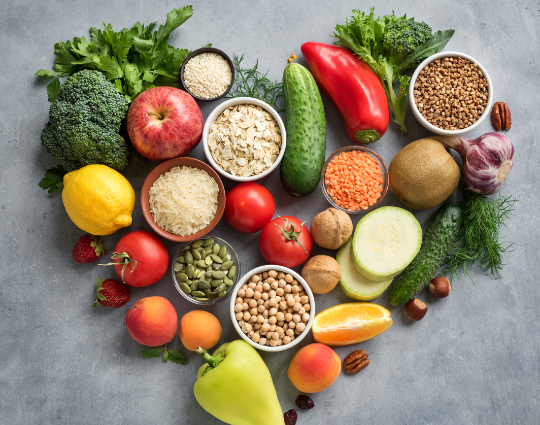By Marcey Klein BS, NC
What is it?
Cholesterol is a fat made from your liver, and many cells in the body. It is converted by enzymes to steroid hormones (which consist of our stress and sex hormones) , vitamin D, and bile salts. Cholesterol is a component of our cell membranes, giving them structure. Our brains are also high in this fat, they consist of about a quarter of all the cholesterol in the body. Our myelin sheaths which coat all of our nerve cells and nerve fibers consist of this cholesterol. Cholesterol is considered a healing compound; our bodies produce cholesterol when there is damage.
When is it problematic?
So cholesterol is essential and necessary for health, however, a problem occurs when these fats become oxidized. Oxidation can occur when there is an abundance of free radicals. They can occur from damaged fats from the diet, inflammation, toxins, lack of cofactors for detoxification, and insulin resistance. High glucose in the blood damages and inflames the arteries. This inflammation can cause damage to the epithelium in the arteries, so cholesterol, specifically LDL cholesterol will be deposited on these tears eventually creating plaque if the damage is not reversed.
Can cholesterol be good?
Cholesterol in itself is not the bad guy. In fact, most studies have shown that high cholesterol alone, without high triglycerides, is not a risk factor for coronary heart disease. and that, in fact, those with the highest serum cholesterol levels, with no other risk factors for heart disease like high blood pressure and high oxidative damage from things like cigarette smoking, live the longest, especially in women. (Ravnskov, 2004) Cholesterol is utilized to create hormones for women after menopause, and if there is no other risk factor than high cholesterol for the individual, then studies have shown that it is not a risk factor at all. (Ravnskov, 2004) Cholesterol is needed for structure in the body, brain health, adrenal and sex hormone production, and cell communication.
Are there tests that can give me an in-depth reading of my cholesterol health?
Yes, there are tests that can look at specific markers for lipids and inflammation, they are:
- VAP (vertical Auto Profile) Cholesterol. This test calculates and differentiates between the small and dangerous LDL’s, and the light and fluffy LDL’s. A far more accurate test for cholesterol than the standard lipid panel.
- C –reactive protein test. This test looks at inflammatory markers in the body, a higher number, >1.3 mg/l indicates an inflammatory condition (chronic or acute) in the body which is associated with an increased risk of CVD. A number <0.8 mg/l is desirable.
- apoB/apoA-1 ratio. The ratio between these two seems to be one of the best lipoprotein related variables to assess coronary risk. (Walldius it al,.2004)
Is there anything I can change in my diet to prevent cholesterol oxidation?
Yes, gearing the diet toward a more anti-inflammatory, high fiber, plant based program can benefit the cardiovascular system immensely. Some specific dietary recommendations are:
- Beneficial fats are anti-inflammatory with extra protective antioxidants. These include extra virgin olive oil, pastured butter, virgin coconut oil, nuts, seeds, and avocados.
- Foods with high vit E content including all nuts and seeds, and wheat germ. This antioxidant specifically helps prevent LDL oxidation
- Fiber A minimum intake of 25 grams, but 50 grams is ideal. Fiber is essential for the body to flush out toxins, extra cholesterol, fat, and bile, a must to maintain healthy cholesterol levels.
- Foods high in antioxidants which include the most colorful fruits and vegetables.
What foods can I include that can help manage my cholesterol?
- Foods rich in bioflavonoids such as all the citrus foods. These foods help manage inflammation, provide antioxidant protection, regulate hormones, support liver, and chelate metals that oxidize such as copper and iron
- Garlic can inhibit the production of cholesterol in the liver
- Dark leafy greens are high in magnesium which can normalize the production of cholesterol (wellnessresources.com)
- Artichoke blocks stimulation of cholesterol synthesis by insulin (Low Dog &Riley, 2003)
- Active Yogurt contains probiotics which convert cholesterol into a less absorbable form which the body can then excrete in the feces. ( Sinatra, 2011)
Which 3 nutrients would you specifically recommend to add to my diet to modulate my cholesterol?
Fiber is very important to increase in order that the body may flush out extra cholesterol, fat, toxins, and hormones. Foods that are rich in fiber include legumes, beans, all vegetables, nuts, and seeds.
Magnesium. If you are deficient in magnesium, the body will have a hard time modulating the production of cholesterol. (wellnessresources.com) Some studies have also shown that it may even inhibit LDL oxidation and can lower LDL and raise HDL.(Bauman 2013) Magnesium rich foods include dark leafy greens, sea vegetables, nuts and seeds, beans, whole grains, and certain fish such as wild salmon and halibut. Therapeutic dosage of magnesium is 300 mg.
Vitamin D can improve all levels of cholesterol and triglycerides. All measures improved as vitamin D levels increased. (Bauman, 2013) The ratios of LDL to HDL improved and triglycerides decreased. A serum level of 50-80 ng/ml is optimal. 2,000 iu daily or more of vit D is recommended depending on serum levels.
What other synergistic foods, herbs, or nutrients can I include?
Garlic helps to lower LDL while raising HDL’s. It also lowers total cholesterol, since the organosulfur in it inhibits the making of cholesterol. It should be used liberally in the diet, but can be taken as a supplement at 2 grams per day.
Dark Chocolate or Cocoa is rich in polyphenols that inhibits LDL oxidation and increases HDL. One ounce a day is the medicinal intake, or 2 tsp raw cacao powder, which also contains these strong polyphenols. These polyphenols have also been shown to make the vascular system more flexible.
Ginger is an antioxidant, a blood thinner, a cardio tonic, anti-inflammatory, and it helps lower cholesterol. (Bauman, 2013)
Turmeric and capsicum help prevent oxidation of LDL, they protect the liver, and are anti-inflammatory. They work better in combination, so use them together in cooking.
Probiotics help the body convert cholesterol into a form that the body can more easily excrete. In particular Enterococcus faecium M-74 has been shown to reduce LDL cholesterol (Bauman, 2013)
Omega 3 fatty acids help bring down inflammation, helps to make the vascular system more flexible, and brings down total cholesterol. 2-4 grams per day is recommended.
Overall, eating an antioxidant rich, diverse diet high in nutrients, fiber, probiotics, good fats and to supplement as necessary, is recommended to keep your cholesterol levels in check and to prevent and control the oxidation of your cholesterol. Please remember to exercise and to keep hydrated to flush toxins out and for healthy blood flow and oxygenation. Come to Wild Roots if you have any further questions on this or any health topic, take care!



